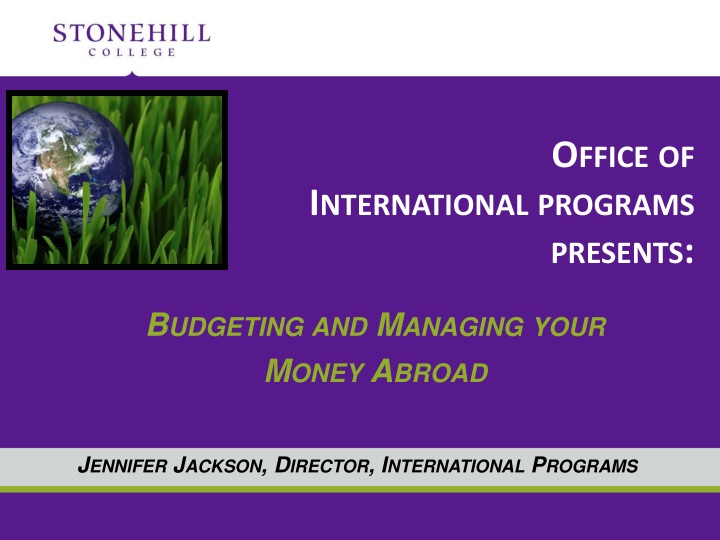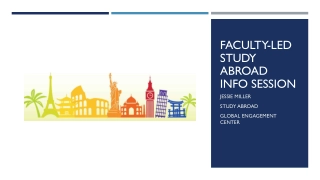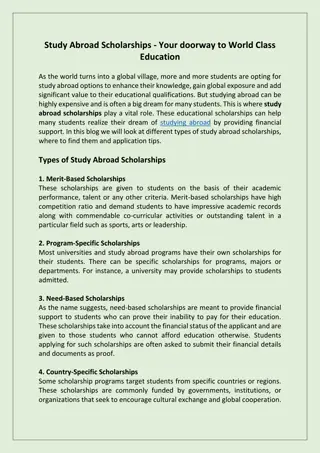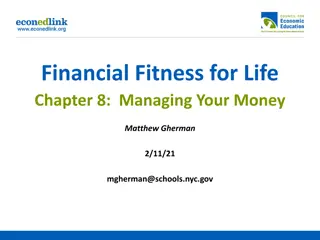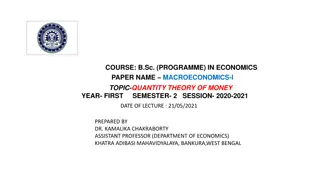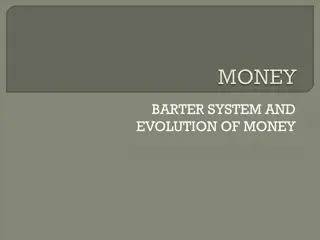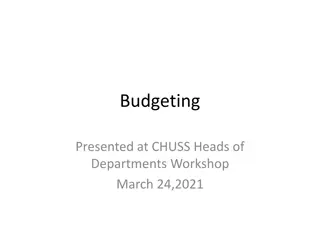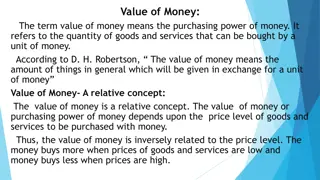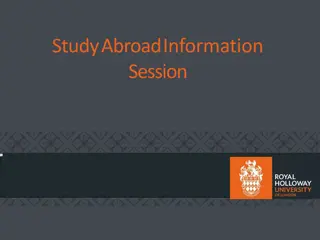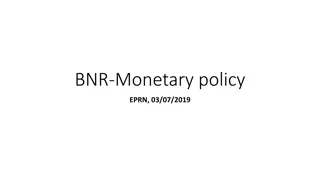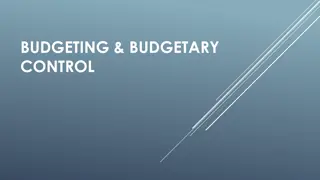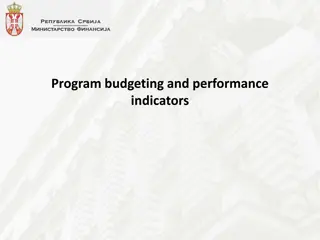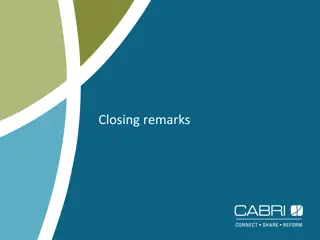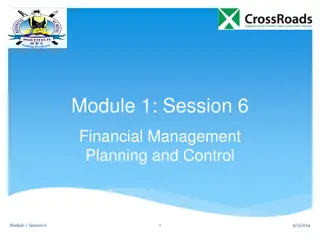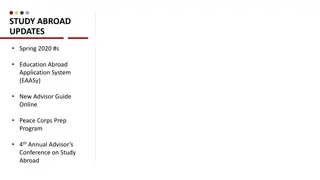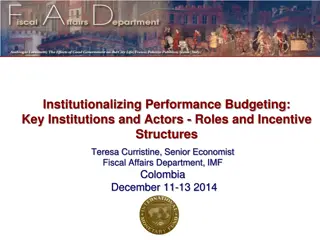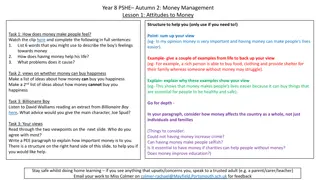Budgeting and Managing Your Money Abroad
Develop a budget for your international program using a financial planning worksheet. Consider additional costs, exchange rates, and independent travel plans. Calculate your budget, track expenses, and manage your spending wisely with helpful tips provided.
Download Presentation

Please find below an Image/Link to download the presentation.
The content on the website is provided AS IS for your information and personal use only. It may not be sold, licensed, or shared on other websites without obtaining consent from the author.If you encounter any issues during the download, it is possible that the publisher has removed the file from their server.
You are allowed to download the files provided on this website for personal or commercial use, subject to the condition that they are used lawfully. All files are the property of their respective owners.
The content on the website is provided AS IS for your information and personal use only. It may not be sold, licensed, or shared on other websites without obtaining consent from the author.
E N D
Presentation Transcript
OFFICEOF INTERNATIONALPROGRAMS PRESENTS: BUDGETING AND MANAGING YOUR MONEY ABROAD JENNIFER JACKSON, DIRECTOR, INTERNATIONAL PROGRAMS
RECAP STONEHILL BILLING & FINANCIAL AID Three billing models: Tuition & room (most common), Tuition, room, & meal plan C, or Tuition only Financial Aid remains unchanged $375 study abroad fee Application fees & housing deposits paid by student directly to program 2
DEVELOPING A BUDGET International Programs Financial Planning Worksheet Know what s included! Obtain estimated additional costs from program provider Factor in necessary costs - program application fees, passport & visa fees, roundtrip airfare, meals, books & supplies, ground & in-country transportation, health exam & immunizations if required Consider extras (variable by program, location, & personal spending habits) supplemental housing costs; in-country travel, special events, & optional excursions; cell phones; toiletries & meds; clothing, luggage, and shoes; laundry; gym; spending money (other travel, socializing, shopping, etc)
FACTORS TO CONSIDER Additional costs not covered by Stonehill Cost of living in your host country - https://www.expatistan.com/cost-of- living/index Exchange rates www.oanda.com currency converter Bank and credit card fees How much independent travel are you planning to do? Have you received additional scholarships or funding to use towards your expenses?
CALCULATING YOUR BUDGET 1. Calculate your big picture number how much can you afford to spend? 2. Figure out your needs food, transportation, and other necessities *always designate an emergency fund 10-15% of overall 3. Figure out your wants excursions, nights out, souvenirs, etc. 4. Convert to your currency 5. Manage your budget stick to it!
HELPFUL TIPS FOR BUDGETING 1. Keep a copy of your budget with you abroad 2. Save receipts and track your spending 3. Organize your expenses into categories 4. Check in once a week and update 5. Re-budget as needed 6. Check exchange rates often 7. When things don t go as planned & cost you extra $$$, relax that is what your emergency funds are for 8. Its OK to splurge (once in awhile). Prioritize and keep things in perspective if something is important to you, make it happen even if its pricey.
HELPFUL TIPS FOR SAVING MONEY Get a student ID card ISIC card through STA travel Take advantage of student discounts they are likely everywhere! Check if your host city offers student discounted rail transportation cards Plan your travel as far in advance as possible (at least two weeks prior) Get a credit card that does not charge fees for international use bankrate.com for a list of credit cards with no foreign transaction fees Currency conversion fees for credit cards vary widely as well as much as 10% - shop around for the best card When possible use ATMs at sister banks of your home bank to avoid extra ATM fees Consider opening a bank account in your host country
MONEY AND BANKING Different forms of having/receiving money: Bank/Debit/ATM Cards Credit Cards Visa TravelMoney Cards Cash Traveler's Checks Wire Transfers
BANK/ATM CARDS PROS: 1. Directly linked to your checking account for easy access to cash 2. Easy to track money being spent 3. Accepted in most places with VISA or MasterCard logo 4. Automatically PIN protected CONS: 1. Subject to foreign ATM fees both from your bank and the foreign bank 2. Many have Currency Conversion fees 3. Withdrawal limits 4. Cannot access saving accounts from abroad
CREDIT CARDS PROS: 1. Avoid per-transaction ATM and debit charges 2. Easy to track money being spent record of purchases 3. VISA or MasterCard logo 4. Credit card rewards could pay for your next flight! 5. Covered for fraudulent charges should your card ever be stolen CONS: 1. Not as widely accepted in some countries as debit cards or cash 2. Cannot withdraw money from an ATM (accept in emergencies) 3. Easy to over-spend with credit cards because it is not actual money
VISA TRAVEL CARDS PROS: 1. Pre-load from your bank account and continue to add money when needed 2. Not linked to your bank account and PIN protected 3. Can be used as a credit card or debit/ATM card 4. Visa or Mastercard logo widely accepted CONS: 1. Monthly fees (around $2.50) 2. Subject to currency conversion fee of up to 7% 3. Might be minimum amount requirements depending on card 4. Be aware of any additional fees for initial use, activation, reload, or cash out fees 5. Use of ATMs involve standard fees
CASH In many countries cash is the preferred and sometimes only, method of payment Always carry some cash with you Limit the amount of cash you carry and try not to carry it all in one place When you use an ATM, take out enough cash for the week to minimize ATM fees Store extra cash in a safe or concealed space never all in the same place With purchases sometimes vendors are willing to negotiate on price if you are paying with cash
TIPS FOR CHANGING MONEY Pre-order a small amount of the local currency from the bank before you go Do NOT convert money at the airport exchange rates there are not favorable Use only official currency conversion booths away from the airport or local banks for converting money beware of locals offering a cash exchange service Do not bring large amounts of US dollars to exchange in your host country many times the exchange rates are better if you use an ATM to withdraw $$$
TIPS FOR BANK/ATM CARDS Find out your bank s foreign ATM and currency conversion fees Ask your bank if they partner with any banks in your study abroad city or if they are willing to waive the ATM fees for you Consider opening an account with a bank with branches in host country Record your bank s contact info and fee structure so you can contact them if there is a discrepancy Always notify your bank of any international travel Use online banking to check transactions regularly to insure no fraudulent charges are made Record amount and reason you withdrew money each time take your receipt!
MORE TIPS FOR BANK/ATM CARDS Stay away from independent ATMS such as Travelelex, Euronet, Moneybox, Cardpoint, and Cashzone Foreign keypads have numbers only so know your PIN by number, not just letter If possible, bring an extra ATM card as a backup in case yours is eaten or demagnetized Use ATMs located outside of banks Use common sense when using ATMs at night make sure they re well-lit and secure be discrete Beware of your bank s withdrawal limit & consider changing it before you go. Many foreign ATMs have their own withdrawal limits Remember to remove your card after a transaction! This is not automatic on some machines there are variations in the way machines work
KEEPING YOUR MONEY SAFE Pack a list of emergency numbers to call in case your cards are lost or stolen If lost or stolen, notify the bank ASAP. Many banks have policies that limit your liability if you notify them within 24 hours Always double-check totals, ask for receipts, and count your change to make sure you received the correct amount Do NOT: 1.) place your purse on the back of a chair 2.) leave your wallet in your coat if hanging on a chair or coat rack 3.) keep your wallet in a backpack 4.) keep your wallet in your back pocket 5.) store all of your money on you in the same place
RESOURCES International Programs Financial Planning Worksheet http://www.stonehill.edu/offices-services/international-programs/tuition-fees-aid/ Cost of living index https://www.expatistan.com/cost-of-living/index Currency Converter - http://www.oanda.com/currency/converter/ Comparisons on banking and credit cards www.bankrate.com International Student Identity Card (ISIC) - http://www.isic.org/ Discount flights - http://www.statravel.com/solutions/stonehill-college.htm
